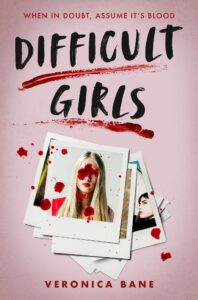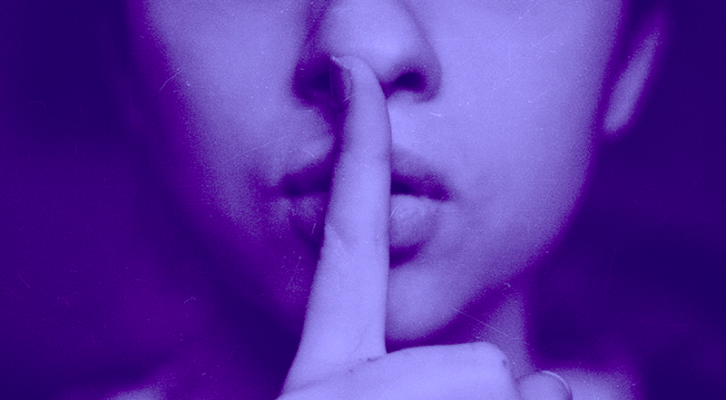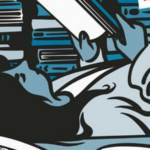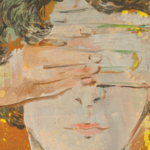As a teen, I was a princess and a witch. I don’t mean my behavior–though my mother might have other arguments to make–rather, I was literally paid to be a princess and a witch at a local theme park. For most of the year, it was my job to arrive early at the candy-colored park, have my face painted in purples and pinks with gemstones at the corners, throw on a ball gown, and sit on a throne while children squealed for the opportunity to take pictures with me. For the month of October, I’d trade my sequins and glitter for a pointed hat and orange-striped socks and preside over a bubbling cauldron.
Many years later, I turned to those days spent breathing in the smell of spray sunscreens and listening to children’s screams as they rode rollercoasters as the inspiration for a story. My time spent in the theme park entertainment world showed me that there was a dark underbelly beneath the shiny, glazed exterior, a darkness that stretched farther than the guests could’ve imagined. What started as the seed of an idea became the backdrop for Difficult Girls, my debut young adult thriller novel that comes out this July. The book takes a microscope to the world of theme park entertainment and examines what lies beneath the surface… and what bloody deeds might be hiding just beyond the curtain.
Of course, my experience working at a theme park wasn’t all bad. In many ways, being a princess face character was the best job of my life. My shifts on the throne were about forty-five minutes and simply required me to act, well, royal. I mastered the wave, the sweet tone, and the general character. Children told me all day long how pretty and nice I was and asked me about my castle. As someone who’s been telling stories for as long as they can remember, I reveled in making up tales about magical creatures and royal mysteries–foreshadowing for my later career as a writer, perhaps. Plus, when I wasn’t on the throne, I was back in the green room, usually reading or interacting with the other performers.
However, there were moments–cracks in the magical facade–when the job was less a dream and more a nightmare. As a face character, I didn’t have any kind of attendant. There were employees that I could call nearby if I needed to, but otherwise, it was up to me to fend off any unwelcome attention while remaining in character.
“Got room in that lap for me?” was a common question from fathers of children who were seated on the throne with me.
“I bet you are a princess,” would also be said with a leer or a wag of the eyebrows. “You should see my castle,” would be whispered as they posed beside me, their little brother or nephew waving excitedly at a flashing camera.
My smile would stick through it all. I’d pretend not to hear them. After all, I couldn’t do anything to show discomfort, to ruin their perfect park experience. I’d risk losing my job, something I needed.
The worst of it was that they knew all of this, had been taught this since they themselves were kids greeting princesses. That’s why they said their comments without fear. They knew I had to smile through it. They saw me as both a child to scorn and a young woman to deride, and in both instances, I was powerless. Here was where the heart of Difficult Girls was truly born; I thought of every other girl in my shoes that would want to fight back but wouldn’t know how, every girl whose anger started to bubble and simmer just beneath the surface at the things they were told they couldn’t change. What would it take to push those girls over the edge, and what would happen when they finally found the courage to fight back and seize the reins?
I knew such a pressure cooker could absolutely come from the walls of a theme park. After all, beyond the guests, there were deeper fissures, ugliness that ran to the park’s core. In addition to being a face character, I was also an usher on the other side of things. I worked–and therefore watched–all of the other shows. Scandals and secrets ran rampant in the entertainment department: rumors of alleged trysts between performers in spaces where cameras couldn’t find them, for example. It was an odd assemblance of people: teenagers, like me, worked the same shows as adults. The environment defaulted to adult as a result, especially given that the teens working wanted nothing more than to be accepted by this department full of beautiful, talented people–no matter the cost.
Later, in 2017, I watched with horror as the news swirled around the allegations against Harvey Weinstein. Allegations of women being cornered in their rooms, told they must exchange their bodies and souls for place and power in the industry. So many people around me decried that such things could never happen, that such acts were so extreme in their evil that they simply couldn’t be true.
But I thought of my experience on that throne and around those other stages, and I knew better.
A theme park entertainment department is simply a microcosm of the entertainment industry at large. It has the same people with dreams shining in their eyes, the stage of opportunity, the camaraderie of a group of creative people building something together. But, I knew, it also had the same predators lurking in the background. The same men who see their power and how they can trap others with it.
My mind skipped steps further. I realized how easy it was to hide crimes under that shimmering exterior of happiness and joy. How easy the dream slipped to nightmare. What might happen, I wonder, if something darker were added to the mix?
Something like murder.
And thus, I began writing the novel that dealt with these things head on. I created a new theme park in the book that would become Difficult Girls and called it Hyper Kid Magic Land, a park built around a popular children’s television show. It had the things I’d loved about working at a theme park: the found family, the glitz and glamor on the smaller scale, the ridiculousness of seeing people’s vacations on a daily basis. But it also took those things I saw and twisted them into a mystery only my teen protagonist could solve. It became, swiftly, a story where angry girls fought back against the people in power who tried to ensnare them.
As a seventeen year old girl in a princess costume, I’d thought I had to take the comments.
The girls in my novel learned they didn’t need to.
_______________________


















